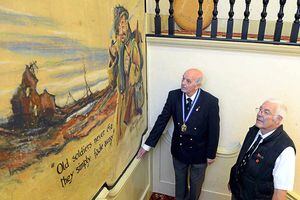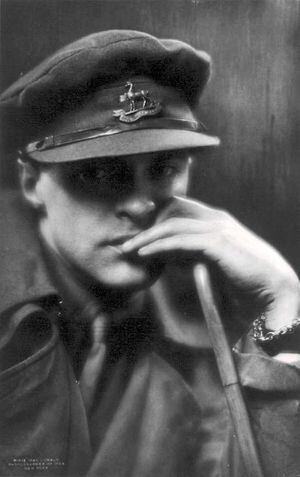Shropshire wall art drawn by 'Banksy of the war'
The work of an artist dubbed the Banksy of the war years has come under the spotlight – and one of his murals is painted on the wall of a historic Shropshire building.

Bruce Bairnsfather was a well known cartoonist in both the First and Second World War. But his role today has been forgotten by many and now a petition has been raised to get official government recognition of the role he played in the war effort so that it can be recognised by generations to come.

It has been revealed that Bairnsfather, best known for his Fragments from France cartoons, published in the weekly Bystander magazine during World War One, was enlisted by MI7 to help raise the country's morale with his work.
But the project was top secret and his role in the war was never officially recognised in public.
Now Major Tonie Holt, the man behind both a biography and memorials raised to Bairnsfather, is hoping to come to Ludlow to document a mural painted directly onto the wall of the town's Royal British Legion building Victory House.
He is also backing the petition asking for Bairnsfather's contribution to be retrospectively recognised in the House of Commons before the 100th anniversary of the publication of his most famous cartoon The Better 'Ole in October 2015.
He said: "I've just recently sent an email to the chairman of Ludlow Royal British Legion saying we'd love to do a talk on Bainsfather in November.
"The value of that mural will be quite something.
"Bairnsfather really was part of a major campaign by MI7 when the government decided a morale-raising campaign was needed – but they had to keep it not obvious.
"His involvement with MI7 is only just becoming known, and his work is now exceedingly collectable."
He said Bairnsfather was a captain in the Warwickshire regiment during the First World War and dubbed him the "Banksy of 1914 to 1918".
"His drawings, based upon personal experience in the trenches, showed life as it really was," he said.
"But at the same time his work allowed everyone to laugh – at themselves, at authority and at the enemy."
"His cartoons were avidly anticipated in the trenches and in most homes in Great Britain, who would also have owned examples of the many pottery items that carried his drawings."
The impact of this artist was not just profound in the UK, but also spread globally among Allied countries during the war.
Major Holt said: "The French, Italian and American Forces, recognising the effect of Bairnsfather's cartoons upon morale, asked for Bairnsfather to work his special magic on their troops too.
"Soon plays and films featuring his archetypal characters, Old Bill, Bert and Alf were making people laugh literally all over the world and he was uniquely created Officer Cartoonist.
"The Secret Service planned the inclusion of propaganda messages in the replies to his fan mail."
The work in Ludlow Legion building, which bears the motto "Old soldiers never die, they simply fade away", is not going anywhere, however – as it is painted directly onto the wall.
Bryan Martin, treasurer at the Ludlow branch of the Royal British Legion, said the work was painted later in Bairnsfather's career, after the Second World War.
"Troops were billeted during at Victory House during the Second World War," he said.
"But the date on it is 1947. He actually came here and painted it."
The building was taken over by the Royal British Legion in 1946 after local people donated more than £1,600 to buy Victory House, so the work would have been freshly painted for the new club.
During the Second World War Bairnsfather continued his Old Bill cartoons.
But he was not asked to help with the British war effort, instead becoming official cartoonist to the American forces in Europe.
Major Holt said, though later, the Ludlow mural was still an important example of his work.
"In 1934 the British Legion Journal said, 'England owes Bruce Bairnsfather a good deal more than its leaders have yet recognised'," he said.
"It is time for that recognition."





